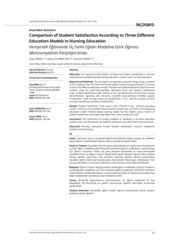Comparison of Student Satisfaction According to Three Different Education Models in Nursing Education
-
Eser Sahibi
FEYZA DERELİ
HATİCE YILDIRIM SARI
YASEMİN TOKEM
-
Tür
Makale
- Yayın Tarihi 2021
-
Yayıncı
İzmir Kâtip Çelebi Üniversitesi Sağlık Bilimleri Fakültesi
- Dergi Adı İzmir Katip Çelebi Üniversitesi Sağlık Bilimleri Fakültesi Dergisi 6, ( 3 ), pp.61 - 66
- Tek Biçim Adres https://hdl.handle.net/11469/1981
-
Konu Başlıkları
Nursing
Education model
Student satisfaction
Classical
İntegrated
Problem-based learning
Hemşirelik
Eğitim modeli
Öğrenci memnuniyeti
Klasik
Entegre
Probleme dayalı öğretim
Objective: The objective of the study is to determine student satisfaction in classical, integrated and problem-based learning education model used in nursing education. Material and Methods: The descriptive-comparative research design study consisted of 621 students from the third and fourth grades (senior-nursing students) in nursing schools with different education models. The data were collected by face to face interview method using the Socio-Demographic Attributes Form and Student Satisfaction Scale. Student Satisfaction Scale consists of the sub-dimensions of instructors, school administration, agreeing with decisions, scientific-social-technical facilities, quality of education. Scale average scores are graded from 1 to 5, and the increase of score averages signifies the increase of satisfaction. Results: Student Satisfaction Scale scores were 2.95±0.6 in the classical education model, 3.33±0.6 in the problem based learning model and 2.95±0.6 in the integrated education model. Problem-based learning model has the highest score in terms of student satisfaction and statistically differs from other models (p<0.05). Conclusion: The satisfaction of nursing students is moderate in all three education model. In the sub-dimensions, the highest satisfaction was observed in the instructors.
Amaç: Çalışmanın amacı, hemşirelik eğitiminde kullanılan klasik, entegre ve probleme dayalı eğitim modellerindeki öğrenci memnuniyetlerini belirlemektir. Gereç ve Yöntem: Karşılaştırmalı tanımlayıcı tipte planlanan araştırmanın örneklemini, üç farklı eğitim modeline sahip hemşirelik okulunda üçüncü ve dördüncü sınıfta okuyan 621 öğrenci oluşturdu. Veriler yüz yüze görüşme yöntemiyle ve Sosyo-Demografik Özellikler Formu ve Öğrenci Doyum Ölçeği kullanılarak toplandı. Öğrenci Memnuniyeti Ölçeği; öğretim elemanları, okul yönetimi, kararlara katılma, bilimsel-sosyal-teknik olanaklar, eğitim kalitesi alt boyutlarından oluşmaktadır. Ölçek puan ortalamaları 1’den 5’e derecelendirilir ve puanların yükselmesi memnuniyet artışını ifade etmektedir. Bulgular: Öğrenci Doyum Ölçeği puanları, Klasik eğitim modelinde 2,95±0,6; Probleme Dayalı Öğretim modelinde 3,33±0,6 ve Entegre eğitim modelinde 2,95±0,6’dır. Probleme Dayalı Öğretim modelinde, öğrenci memnuniyeti açısından en yüksek puana sahip olup diğer modellerden istatistiksel olarak farklıdır (p<0.05). Sonuç: Hemşirelik öğrencilerinin memnuniyetleri üç eğitim modelinde de orta düzeydedir. Alt boyutlarda en yüksek memnuniyet öğretim elemanları boyutunda gözlenmiştir.
-
Koleksiyonlar
FAKÜLTELER
SAĞLIK BİLİMLERİ FAKÜLTESİ

 Tam Metin
Tam Metin

